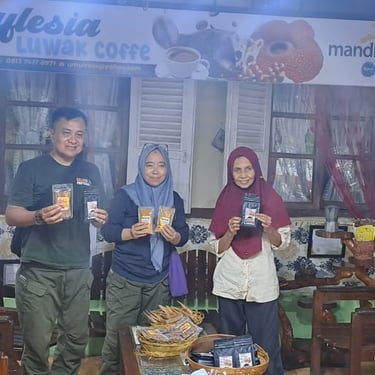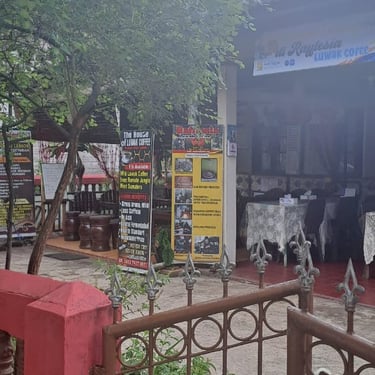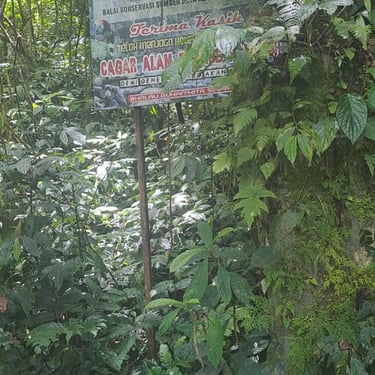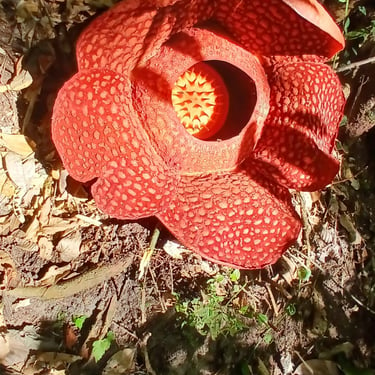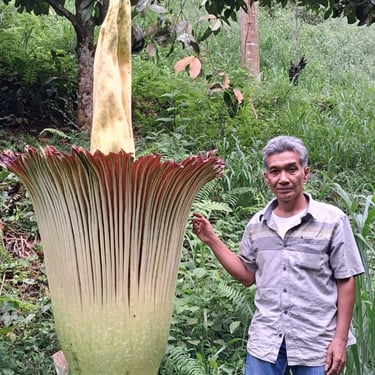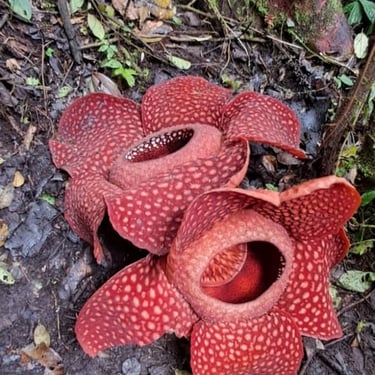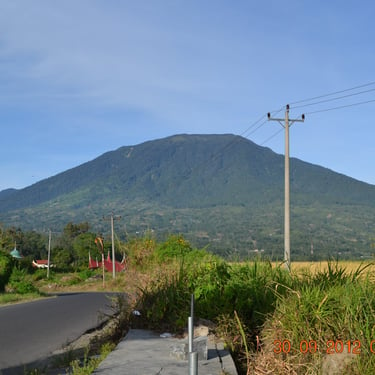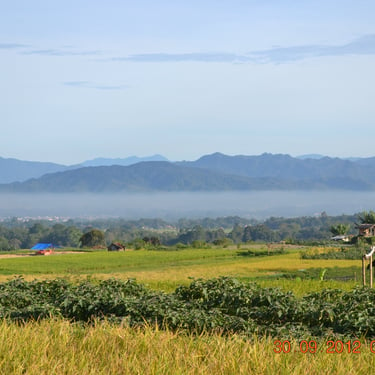RAFLESIA FLOWERS , BATANG PALUPUAH CONSERVATION TREKKING
Batang Palupuah Trekking Tours | Rafflesia & Titan Arum Conservation | West Sumatra Eco-Tourism | Day Trips & Overnight Packages | Book Online
BATANG PALUPUAH CONSERVATION TREKKING
Rafflesia & Titan Arum Flower Discovery Experience
LOCATION & OVERVIEW
Batang Palupuah Nature Reserve is located in Jorong Batang Palupuh, Nagari Koto Rantang, Agam Regency, West Sumatra, Indonesia. This 3.4-hectare conservation area is situated 104 kilometers north of Padang City and approximately 50 meters from the Trans-Sumatran highway connecting Bukittinggi to Pasaman.
The reserve is home to Indonesia's most spectacular endemic flora, including the world's largest flower (Rafflesia Arnoldii) and the infamous Titan Arum (Amorphophallus titanum), locally known as "Bunga Bangkai" or corpse flower.
One day Trekking Raflesia Ornaldi
PACKAGE A: DAY TRIP ADVENTURE (1 Day)
Price : USD 150,00 for Two Person
DETAILED ITINERARY:
05:00 AM - DEPARTURE & MORNING JOURNEY
Hotel Pick-up: Professional guide collects guests from designated Padang/Bukittinggi hotels
Vehicle Details: Toyota Avanza/Innova with AC, comfortable seating for 4-6 passengers
Driver Profile: Licensed, English-speaking driver with 5+ years mountain road experience
Route Information: 104km journey via Trans-Sumatran Highway, scenic mountain views
Morning Briefing: Introduction to day's activities, weather update, safety protocols
Comfort Stops: Restroom facilities available, motion sickness medication provided if needed
07:00 AM - TRADITIONAL BREAKFAST EXPERIENCE
Location: Authentic roadside "Rumah Makan" (local restaurant) in Maninjau area
Menu Highlights:
Nasi Kapau with rendang, ayam pop, and vegetables
Fresh tropical fruits: papaya, pineapple, banana
Traditional Minangkabau coffee (strong, black, locally grown)
Vegetarian alternatives: Sayur nangka, tahu goreng, tempeh
Cultural Context: Learn about Minangkabau culinary traditions and spice cultivation
Duration: 45 minutes for leisurely breakfast and cultural orientation
Photography: Opportunity to capture traditional architecture and local life
08:30 AM - ARRIVAL & CONSERVATION BRIEFING
Entrance Registration:
Official permit verification and visitor logbook signing
Payment of conservation fee (IDR 25,000/person) to local community fund
Distribution of visitor guidelines and trail map
Meet Conservation Team:
Introduction to certified local guide (minimum 3 years experience)
Background on Batang Palupuah's conservation history since 1995
Overview of current research projects and community involvement
Safety Equipment Check:
Distribution of walking sticks and emergency whistles
First-aid kit inspection and emergency contact information
Weather conditions assessment and gear recommendations
Flora Introduction Session:
Educational briefing about Rafflesia lifecycle (7-9 months from bud to bloom)
Titan Arum characteristics and blooming patterns (unpredictable timing)
Conservation challenges and local protection efforts
Photography ethics and "Leave No Trace" principles
09:00 AM - PRIMARY TREKKING EXPEDITION
Trail Characteristics:
Distance: 1.2km to first Rafflesia location
Elevation: 200m gradual ascent through primary rainforest
Surface: Natural earth path with exposed roots, occasional muddy sections
Difficulty: Moderate (suitable for average fitness levels)
Flora Discovery Process:
Rafflesia Spotting: Guide uses knowledge of host plants (Tetrastigma vines) to locate specimens
Species Identification: Distinguish between R. Arnoldii (world's largest) and R. Rhizanthes Deceptor
Bloom Status Assessment: Categorize flowers as bud, blooming, or decomposing stages
Photography Guidelines: Maintain 2-meter distance, no flash photography, respect flowering areas
Conservation Education:
Hands-on learning about rainforest ecosystem interdependence
Understanding threats: habitat loss, illegal collection, climate change
Local community role in protection and sustainable tourism development
Endemic Species Spotting:
Secondary flora: Wild orchids, pitcher plants (Nepenthes), giant ferns
Medicinal plants used in traditional Minangkabau healing
Identification of host trees and epiphytic relationships
11:00 AM - FOREST IMMERSION BREAK
Location: Natural clearing with fallen log seating area
Refreshments:
Traditional snacks: Keripik sanjai (cassava chips), local nuts
Fresh coconut water directly from source
Herbal tea made from forest plants (guided preparation)
Wildlife Observation:
Bird watching: Hornbills, sunbirds, forest kingfishers
Insect identification: Exotic butterflies, beetles, beneficial insects
Primate spotting opportunities (long-tailed macaques, if present)
Mindfulness Session: 10-minute guided forest meditation and sound identification
Educational Activities:
Tree ring counting and age estimation techniques
Soil composition analysis and forest floor ecosystem explanation
Traditional forest navigation methods used by local communities
11:30 AM - TITAN ARUM EXPEDITION
Advanced Trekking:
Route: 800m deeper into conservation core area
Terrain: More challenging with stream crossings and steeper inclines
Special Access: Restricted area normally closed to general public
Titan Arum (Bunga Bangkai) Exploration:
Scientific Name: Amorphophallus titanum - detailed botanical explanation
Cultural Significance: Local folklore and traditional beliefs about the "corpse flower"
Blooming Phenomenon: Rare 3-day blooming cycle every 3-7 years
Sensory Experience: Understanding the distinctive odor's biological purpose
Microhabitat Analysis:
Soil pH testing and nutrient composition discussion
Temperature and humidity measurements in Titan Arum growing zones
Companion species identification and symbiotic relationships
Conservation Monitoring:
Participate in citizen science: GPS marking and condition recording
Learn about propagation efforts and seedling protection programs
Understanding climate change impacts on blooming patterns
12:30 PM - AUTHENTIC JUNGLE LUNCH EXPERIENCE
Setting: Specially designated forest clearing with traditional bamboo shelters
Menu Specialties:
Main Course: Nasi bungkus (wrapped rice) with rendang sapi, ayam gulai
Fresh Vegetables: Sayur pakis (fiddlehead ferns), raw vegetables with sambal
Tropical Fruits: Just-picked rambutan, mangosteen, salak (snake fruit)
Beverages: Fresh palm sugar drink, traditional herbal tea
Vegetarian Options: Tempeh rendang, sayur lodeh, fresh fruit salad
Cultural Integration:
Traditional eating methods using banana leaves as plates
Sharing stories from local conservationists about forest life
Learning basic Minangkabau phrases and forest terminology
Educational Component:
Discussion about sustainable forest harvesting practices
Traditional food preservation methods used by forest communities
Medicinal properties of local plants and fruits consumed
01:30 PM - INTENSIVE CONSERVATION IMMERSION
Deep Forest Exploration:
Advanced Trail: 1.5km circuit through old-growth forest sections
Canopy Observation: Understanding forest layers and biodiversity distribution
Water Source Protection: Visit natural spring and learn about watershed conservation
Professional Photography Workshop:
Technical Skills: Macro photography techniques for small flora details
Composition: Using natural lighting in dense forest conditions
Ethics: Responsible wildlife photography without habitat disturbance
Equipment: Professional guide provides basic photography tips and camera settings
Community Conservation Projects:
Nursery Visit: See Rafflesia propagation research facility
Seedling Program: Participate in planting native species for habitat restoration
Monitoring Systems: Learn about camera trap programs for wildlife research
Traditional Knowledge Exchange:
Meet elderly community members sharing traditional forest wisdom
Learn about historical land use and indigenous conservation practices
Understanding the integration of modern science with traditional knowledge
03:00 PM - COMPREHENSIVE RETURN JOURNEY
Alternative Route: Different path back showcasing varied forest ecosystems
Final Flora Documentation:
Species Checklist: Complete identification guide of observed plants
Conservation Status: Understanding IUCN Red List classifications for endemic species
Seasonal Variations: How flora changes throughout the year
Last-Minute Discoveries:
Opportunity for additional Rafflesia findings along return route
Secondary conservation areas with different microhabitats
Traditional plant uses for food, medicine, and construction
Reflection Period:
Guided discussion about conservation experience and personal insights
Q&A session with guide about forest ecology and conservation challenges
Planning for potential return visits during different blooming seasons
04:00 PM - COMPREHENSIVE DEPARTURE PREPARATION
Personal Care Facilities:
Clean-up station with fresh water, soap, and towels
Leech removal assistance and minor wound treatment if needed
Change of clothes facilities (basic shelter provided)
Gear Collection & Maintenance:
Equipment cleaning and proper storage for next visitors
Photography equipment care and memory card backup services
Lost item recovery and personal belongings check
Conservation Souvenir Shopping:
Available Items: Handmade crafts by local women's cooperatives
Products: Traditional weavings, natural soap, dried spices, coffee beans
Educational Materials: Guidebooks, postcards, conservation awareness materials
Pricing: Fair trade principles with direct community benefit
Documentation & Certification:
Conservation Certificate: Personalized participation certificate
Species Checklist: Complete list of flora and fauna observed
GPS Coordinates: Record of exact locations visited for future reference
Contact Information: Local guide contact for future visit planning
04:30 PM - SCENIC RETURN JOURNEY
Route Optimization: Alternative scenic route through traditional Minangkabau villages
Cultural Stops:
Traditional house architecture viewing opportunities
Local handicraft workshop visits (optional 15-minute stops)
Panoramic viewpoint for Maninjau Lake photography
Comfort Features:
Air conditioning and comfortable seating for tired trekkers
Bottled water and light snacks provided during journey
Traditional music playlist featuring Minangkabau cultural songs
Educational Continuation:
Guide shares additional information about regional conservation efforts
Discussion about similar conservation sites throughout Indonesia
Planning resources for extended Sumatra wildlife exploration
07:00 PM - ARRIVAL & TOUR CONCLUSION
Hotel Drop-off Service: Door-to-door return to original pick-up locations
Final Documentation: Group photo opportunities at hotel with conservation certificates
Follow-up Information:
Contact details for tour feedback and future booking inquiries
Social media connection for ongoing conservation updates
Resource materials for continued learning about Indonesian biodiversity
Optional Extensions: Information about related eco-tourism opportunities in West Sumatra
------------------------------------------------------------------------------------------
PACKAGE B: OVERNIGHT EXPEDITION (2 Days 1 Night)
Price : USD. 300 For two Person
DAY 1: CULTURAL IMMERSION & FOREST INTRODUCTION
02:00 PM - LEISURELY DEPARTURE & CULTURAL JOURNEY
Hotel Collection: Relaxed afternoon departure from Padang/Bukittinggi accommodations
Scenic Route Selection: Traditional village road showcasing rural Minangkabau life
Cultural Stops En Route:
Traditional Gadang House viewing (iconic Minangkabau architecture)
Local coffee plantation visit with farmer interaction (20-minute stop)
Handicraft village observation - traditional weaving and wood carving
Educational Journey: Guide provides cultural and historical context during travel
Comfort Features: Spacious vehicle with extra luggage space for overnight gear
Photography Opportunities: Panoramic mountain views and traditional village scenes
04:30 PM - HOMESTAY ARRIVAL & CULTURAL WELCOME
Accommodation Details:
Traditional Homestay: Authentic Minangkabau family compound
Room Features: Clean private/shared rooms with mosquito nets, basic amenities
Facilities: Shared bathroom with hot water, traditional sitting areas
Cultural Authenticity: Real family home, not tourist-focused guesthouse
Welcome Ceremony:
Traditional Greeting: Minangkabau welcome ritual with host family
Welcome Drink: Fresh coconut water or traditional tamarind drink
Room Orientation: Explanation of facilities and house rules
Cultural Etiquette: Briefing on appropriate behavior in Minangkabau household
Initial Cultural Exchange:
Meet host family members and learn about their conservation involvement
Basic Minangkabau language lesson (greetings and essential phrases)
Overview of evening and next day activities
05:00 PM - COMPREHENSIVE VILLAGE & CONSERVATION ORIENTATION
Community Conservation Center Visit:
Historical Background: 30-year conservation history of Batang Palupuah
Community Leadership: Meet key figures in local conservation movement
Success Stories: Examples of community-based conservation achievements
Challenges Discussion: Current threats and ongoing protection efforts
Traditional Conservation Methods:
Indigenous Practices: Traditional forest protection systems (hutan larangan)
Seasonal Calendars: Understanding traditional ecological knowledge
Plant Usage: Sustainable harvesting techniques for medicinal plants
Water Source Protection: Traditional watershed management practices
Modern Conservation Integration:
Scientific Research: Current university partnerships and research projects
Technology Use: Camera traps, GPS mapping, and data collection methods
Education Programs: School initiatives and community awareness campaigns
Visitor Impact Assessment:
Understanding how tourism supports conservation financially
Carrying capacity discussions and sustainable visitor numbers
Visitor guidelines and impact minimization strategies
06:00 PM - AUTHENTIC MINANGKABAU DINNER EXPERIENCE
Dining Setting: Traditional communal eating in family compound
Complete Menu Experience:
Main Dishes: Rendang daging (authentic slow-cooked beef), ayam pop (traditional fried chicken)
Vegetable Dishes: Sayur nangka (young jackfruit curry), gulai tunjang (traditional vegetable stew)
Rice Varieties: Traditional red rice and white jasmine rice
Condiments: Multiple sambal varieties, kerupuk, and traditional pickles
Vegetarian Alternatives: Rendang tahu/tempeh, vegetable curries, fresh salads
Cultural Dining Experience:
Traditional Etiquette: Proper hand-eating techniques and cultural customs
Family Stories: Host family shares personal conservation stories and experiences
Recipe Sharing: Learn about traditional spice combinations and cooking methods
Cultural Context: Understanding food's role in Minangkabau social structure
Conservation Storytelling Session:
Personal Narratives: Local conservationists share 20+ years of forest protection experience
Historical Changes: How the forest and wildlife have changed over decades
Success Stories: Specific examples of species recovery and habitat restoration
Future Vision: Community goals for next generation conservation efforts
07:30 PM - COMPREHENSIVE NIGHT FOREST EXPEDITION
Pre-Night Walk Preparation:
Safety Equipment: Professional LED headlamps, backup torches, emergency whistles
Clothing Check: Long pants, closed shoes, insect repellent application
Group Safety Briefing: Night forest protocols and emergency procedures
Traditional Elements: Option to use bamboo torches alongside modern lighting
Nocturnal Wildlife Discovery:
Night-Active Species:
Flying squirrels (Petaurista petaurista) - gliding demonstrations if spotted
Slow lorises (Nycticebus coucang) - rare primate night behavior observation
Civets and other nocturnal mammals - tracking and identification techniques
Night birds: Owls, nightjars, and other nocturnal species calls identification
Insect and Arachnid Exploration:
Bioluminescent Species: Fireflies and glowing fungi identification
Nocturnal Pollinators: Night-active moths and beetles crucial for forest reproduction
Predator-Prey Interactions: Observing nocturnal hunting and feeding behaviors
Spider Diversity: Identifying various night-active spider species and web types
Night-Blooming Flora Discovery:
Evening Flowers: Species that open specifically at night for nocturnal pollinators
Aromatic Plants: Night-fragrant flowers and their ecological purposes
Fungal Activity: Mushrooms and fungi more active in cool night conditions
Plant Behavior: Understanding how plants respond differently in darkness
Traditional Knowledge Integration:
Historical Night Practices: How local people traditionally used forests at night
Navigation Techniques: Traditional wayfinding using stars, sounds, and landmarks
Medicinal Night Plants: Species traditionally collected in evening hours
Cultural Beliefs: Local folklore and traditional stories about night forest spirits
Sensory Immersion Experience:
Sound Identification: Learning to distinguish different nocturnal animal calls
Night Vision Adaptation: Techniques for better night forest observation
Temperature Changes: Understanding how forest microclimate changes after dark
Mindfulness Session: 15-minute guided night meditation in forest clearing
09:30 PM - EVENING CULTURAL ACTIVITIES & REST PREPARATION
Traditional Entertainment:
Local Music: Traditional Minangkabau instrumental music performance (optional)
Storytelling: Local legends and folk tales related to forest conservation
Handicraft Demonstration: Evening weaving or carving activities
Next Day Preparation:
Weather Briefing: Conditions forecast and appropriate gear recommendations
Route Planning: Detailed explanation of tomorrow's intensive trekking itinerary
Health Check: Any concerns or special requirements discussion
Rest Facilities:
Comfortable Bedding: Traditional mattresses with modern comfort standards
Mosquito Protection: Nets and natural repellent options
Bathroom Facilities: Hot water availability and traditional toiletry options
DAY 2: INTENSIVE CONSERVATION EXPEDITION & CULTURAL CONCLUSION
05:30 AM - TRADITIONAL DAWN AWAKENING
Natural Wake-up: Dawn bird chorus and traditional morning prayers
Morning Preparation: Fresh mountain air and traditional wash facilities
Cultural Morning Ritual: Optional participation in family morning activities
06:00 AM - COMPREHENSIVE BREAKFAST & DAY PREPARATION
Traditional Breakfast Menu:
Local Specialties: Bubur kampiun (traditional rice porridge), ikan goreng (fried fish)
Fresh Options: Tropical fruit salad, fresh coconut milk, traditional herbs tea
Energy Foods: Local honey, traditional nuts, and energy-rich snacks for trekking
Dietary Accommodations: Vegetarian and special dietary requirements catered
Professional Preparation Session:
Gear Distribution: Professional trekking poles, emergency equipment, rain protection
Health Assessment: Final health check and any medication reminders
Safety Protocols: Emergency contact information and evacuation procedures review
Photography Equipment: Camera protection, extra batteries, memory card backup
Cultural Send-off: Host family blessing ceremony for safe forest journey
07:00 AM - INTENSIVE MULTI-LOCATION CONSERVATION EXPEDITION
Advanced Forest Access: Professional guide leads to rarely visited conservation zones
Location 1: Primary Rafflesia Habitat (Distance: 2.1km)
Scientific Documentation: GPS mapping and condition assessment of multiple specimens
Biological Education: Detailed explanation of Rafflesia parasitic lifecycle
Photography Workshop: Professional techniques for macro flora photography
Conservation Monitoring: Participate in ongoing research data collection
Threat Assessment: Understanding current challenges to Rafflesia survival
Location 2: Secondary Conservation Area (Distance: 1.8km)
Rafflesia Rhizanthes Deceptor: Specialized search for this smaller, rarer species
Habitat Comparison: Understanding microhabitat differences between species
Botanical Documentation: Complete species identification and characteristics
Host Plant Study: Detailed examination of Tetrastigma vine relationships
Propagation Research: Learn about artificial cultivation attempts
Location 3: Research Conservation Plot (Distance: 1.5km)
University Partnership Area: Visit active research site with measuring equipment
Long-term Monitoring: Understanding 20+ year conservation data trends
Seedbank Project: Participation in seed collection and storage programs
Habitat Restoration: View ongoing forest rehabilitation projects
Community Involvement: Meet local research assistants and their contributions
Location 4: Remote Titan Arum Sanctuary (Distance: 2.3km)
Exclusive Access: Special permission area normally closed to tourists
Multiple Specimens: Opportunity to observe Titan Arum in different life stages
Ecological Relationships: Understanding pollination and reproduction strategies
Climate Monitoring: Temperature and humidity measurement in microhabitats
Traditional Knowledge: Local names, uses, and cultural significance
12:00 PM - WILDERNESS SURVIVAL LUNCH EXPERIENCE
Remote Forest Location: Deep forest setting away from standard tourist areas
Enhanced Menu Experience:
Freshly Prepared: Local women prepare food using traditional forest cooking methods
Wild Ingredients: Incorporation of safe, edible forest plants and herbs
Traditional Cooking: Bamboo cooking techniques and leaf-wrapped foods
Water Source: Fresh spring water directly from protected forest watershed
Cultural Integration: Learn traditional food preservation and forest survival techniques
Educational Lunch Activities:
Plant Identification: Learn about edible vs. poisonous forest plants
Traditional Tools: Experience traditional cutting and preparation implements
Fire Making: Traditional methods for sustainable forest fire creation
Water Purification: Traditional and modern methods for safe forest water consumption
Conservation Discussion Session:
Impact Assessment: Evaluate morning's conservation observations
Research Integration: How tourist observations contribute to scientific knowledge
Long-term Planning: Community goals for next decade of conservation efforts
International Cooperation: Role of international visitors in conservation support
01:30 PM - ADVANCED BOTANICAL RESEARCH & DISCOVERY
Systematic Flora Survey: Professional guided identification of 30+ endemic species
Scientific Methodology:
GPS Mapping: Record exact coordinates of significant species locations
Photographic Documentation: Creating scientific-quality specimen photographs
Measurement Techniques: Learning proper botanical measurement and recording methods
Condition Assessment: Evaluating plant health and environmental pressures
Specialized Habitats Exploration:
Epiphyte Communities: Understanding tree-dwelling plant ecosystems
Stream Ecosystems: Aquatic and semi-aquatic plant communities
Soil Analysis: Understanding soil composition requirements for endemic species
Canopy Observation: Using binoculars to study upper forest layer biodiversity
Traditional Botanical Knowledge:
Medicinal Applications: Traditional healing uses for various forest plants
Seasonal Variations: How plants change throughout annual cycles
Sustainable Harvesting: Traditional methods for taking plants without ecosystem damage
Cultural Classification: Local naming systems and plant categorization methods
Conservation Technology Integration:
Camera Trap Data: Review wildlife monitoring footage and data interpretation
GPS Tracking: Understanding animal movement patterns through forest areas
Weather Monitoring: Local climate data collection and trend analysis
Database Contribution: How visitor observations contribute to conservation databases
03:30 PM - COMPREHENSIVE RETURN EXPEDITION
Alternative Advanced Route: 3.2km return journey through different forest ecosystem
Ecosystem Transition Study: Observe changes from primary to secondary forest areas
Final Discovery Opportunities:
Late-Day Flora Activity: Species that are more active in afternoon conditions
Behavioral Observations: Animal activity patterns in late afternoon forest
Seasonal Indicators: Understanding how forest changes throughout the year
Climate Variation: Experiencing forest microclimate changes throughout the day
Comprehensive Species Review:
Checklist Completion: Final identification and counting of observed species
Photography Review: Organizing and categorizing photographic documentation
Conservation Status Update: Understanding current protection levels for observed species
Future Monitoring: Learning how visitors can contribute to ongoing conservation efforts
Cultural Integration Conclusion:
Traditional Knowledge Summary: Reviewing traditional ecological wisdom learned
Modern Science Integration: Understanding how traditional and modern knowledge combine
Personal Impact Assessment: Reflection on individual conservation awareness growth
Community Connection: Planning for ongoing relationship with conservation community
04:30 PM - CULTURAL CONCLUSION & DEPARTURE CEREMONY
Homestay Return: Final time at traditional family compound
Cultural Appreciation Ceremony:
Traditional Farewell: Minangkabau departure blessing and gratitude expression
Gift Exchange: Appropriate cultural gift giving between visitors and hosts
Photo Documentation: Professional group photos with host family and guides
Contact Exchange: Personal contact information for ongoing cultural connection
Conservation Certification Process:
Detailed Certificate: Personalized document listing specific conservation contributions
Species Observation Record: Complete list of flora and fauna documented during visit
GPS Coordinate Record: Exact locations visited for future reference and return trips
Research Contribution: Documentation of visitor contributions to ongoing conservation research
Final Preparation & Check-out:
Personal Care Facilities: Shower and change facilities before departure
Gear Cleaning: Professional cleaning and maintenance of borrowed equipment
Lost Item Recovery: Final check for personal belongings throughout homestay
Travel Preparation: Packing assistance and travel comfort preparation for return journey
05:00 PM - SCENIC CULTURAL RETURN JOURNEY
Extended Cultural Route: 3-hour journey through traditional villages and scenic areas
Cultural Stops Schedule:
5:15 PM: Traditional silver crafts village (20-minute cultural shopping stop)
5:45 PM: Panoramic lake viewpoint with traditional coffee stop (25 minutes)
6:25 PM: Traditional weaving cooperative visit (15-minute cultural appreciation)
Educational Journey Continuation:
Regional Conservation: Information about other conservation sites throughout West Sumatra
Cultural Context: Deep discussion about Minangkabau environmental philosophy
Future Planning: Resources for continued learning about Indonesian biodiversity
Network Building: Contact information for related conservation organizations
Comfort and Reflection:
Comfortable Transportation: Air conditioning and relaxation after intensive forest activities
Refreshments: Traditional snacks and beverages for comfortable return journey
Music and Culture: Traditional Minangkabau music and cultural audio experiences
Personal Reflection: Guided discussion about conservation experience and personal insights
08:00 PM - COMPREHENSIVE TOUR CONCLUSION
Hotel Return Service: Door-to-door return to original accommodation
Final Documentation Package:
Digital Photo Collection: Professional photographs from entire expedition
Educational Materials: Comprehensive guidebooks and conservation information
Contact Database: Complete contact information for all cultural and conservation connections
Future Visit Planning: Resources and contacts for potential return visits
Follow-up Services:
Conservation Updates: Registration for ongoing conservation news and updates
Cultural Connection: Ongoing communication opportunities with host families
Referral Network: Information for recommending experience to other travelers
Impact Reporting: How to receive updates on conservation projects supported by tourism fees
Extended Opportunity Information:
Related Experiences: Information about similar conservation tourism throughout Indonesia
Volunteer Opportunities: Options for longer-term conservation involvement
Research Participation: Opportunities to contribute to ongoing scientific research
Cultural Exchange: Programs for deeper cultural immersion and language learning
